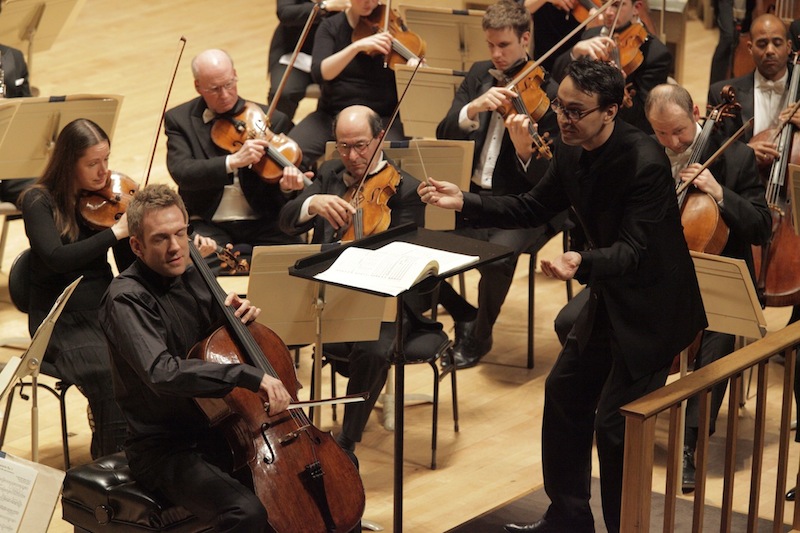Ken-David Masur steps in, makes impressive BSO debut
Rule One for assistant conductors: Don’t upstage the boss.
Ken-David Masur, assistant conductor of the Boston Symphony Orchestra since last September, didn’t plan any such thing. He wasn’t even slated to conduct the BSO until next summer in Tanglewood.
But no sooner was music director Andris Nelsons out of town this week than Masur was called on to conduct Thursday night in place of the ailing Tugan Sokhiev—and, incidentally, make his BSO subscription series debut about a year ahead of schedule.
And suddenly, the BSO found itself with not one but two gifted young in-house conductors making impressive debuts in a space of four months.
Leading a program inherited from the indisposed Sokhiev–Berlioz’s overture Le Corsaire, Saint-Saëns’s Cello Concerto No. 1, and Rimsky-Korsakov’s Scheherazade–Masur marshaled the troops effectively, drew some delicious special effects from them, and converted the encouraging welcome he received at his first entrance into prolonged, delighted applause at the end.
And if the debutant maestro didn’t quite make listeners say “Andris Who?” he surely inspired thoughts of “Who is this Masur? Is he any relation to the other conductor named Masur?”
The slender, bespectacled conductor’s fresh-out-of-school appearance belies his age (37), his extensive studies (at Columbia University, Leipzig Conservatory, Manhattan School of Music, among others), conducting posts with notable orchestras in France, Canada, and the U.S.A., and guest engagements around the world from Moscow to Memphis to Hiroshima.
He studied conducting mainly with his father, the venerable Kurt Masur, and was a conducting fellow at Tanglewood in July 2012 when he made an auspicious BSO debut sharing conducting duties on an all-Mozart program with his father, who was recovering from an injury.
Conducting Berlioz’s brash, brilliant overture Thursday, the youthful-looking Masur often had the air of a kid living out a fantasy as he bounced eagerly on his toes and gleefully cued the brass. If the strings didn’t dig very deep in the passionate slow theme, they and everyone else responded with alacrity to the conductor’s urgings in the up-tempo sections.
Like Schumann’s Piano Concerto, Saint-Saëns’s First Cello Concerto is a work of great charm and imagination that, because of its moderate technical demands on the soloist, has fallen from favor on concert programs in this age of competing supervirtuosos. Thursday’s lively performance by Masur and the German-Canadian cellist Johannes Moser, bringing this concerto back to the BSO after a 25-year absence, reminded one why the piece was once such a favorite.
Saint-Saëns was in fact an admirer of Schumann, and in this work he added an elegant French accent to the latter’s tender sentiment and wit. While avoiding over-the-top pyrotechnics in the solo part, he nevertheless gave the cellist plenty to do, and on Thursday Moser appeared to take athletic pleasure in the double-stops, the blazing scales, the rapid string-crossing, the bow-bouncing spiccato, and all his part’s other technical challenges.
Addressing his instrument with both poise and emotional involvement, Moser played expressively, with a mellow, unforced tone that nevertheless carried well in the large hall. Conductor Masur attentively provided support and well-placed daubs of orchestral color.
A highlight of the performance was the touching minuet interlude, delicately introduced by Masur and the orchestra, then artfully developed into a witty dialogue between the soloist and the other players. Cellist and orchestra finished the concerto with panache, earning the audience’s enthusiastic applause.
Speaking of highlights, BSO concertmaster Malcolm Lowe gave a fine rendering of the extensive violin solos in Scheherazade, a bit cool at first but warming to the urgency of the storytelling princess’s potentially fatal situation.
One wished, however, that he’d gone to his office to practice instead of sitting alone at the front of the stage and running through his part at full volume during intermission. One often hears little “spoilers” of the piece to come as an orchestra warms up, but this was a bit too much.
Melodious and spectacular as it is, Rimsky-Korsakov’s score can seem somewhat disjointed and repetitious when heard straight through in performance. Masur didn’t make it easier for himself by taking an unusually broad tempo in the first movement, the better to suggest the big ocean waves under Sinbad’s ship, but slowing down the proceedings considerably.
But if the performance overall lacked something in narrative drive, one could take pleasure in the vivid colors Masur coaxed from the players, the picturesque episodes, the hair-raising roar of the trombones and wail of the piccolo in the climactic shipwreck, and the crisp execution overall by the full ensemble, especially in the fast, turn-on-a-dime changes of meter in the “festival at Baghdad” finale.
Principal bassoonist Richard Svoboda’s heart must leap at the sight of a Russian composer’s name in the program. Here as in previous performances of Tchaikovsky, Rachmaninoff and Stravinsky, his darkly expressive solos, as well as the penetrating tones of principal oboist John Ferrillo and the organ-like blend of the entire wind section, provided some of the performance’s most memorable moments.
Audience demography has become a salient subject at the BSO in the Nelsons era. To oversimplify cause and effect, the youth of the maestros onstage seems to be reflected in the changing composition of the crowd in the house.
On Thursday, the under-30 set seemed to have turned out in record numbers, as if the Green Line had made a wrong turn and deposited its college-student cargo in Symphony Hall. They looked happy to be there, and even waited for the house lights to come up before taking out their devices. One hopes they come back often.
The program will be repeated 1:30 p.m. Friday and 8 p.m. Saturday. bso.org; 617-266-1200.
Posted in Performances





